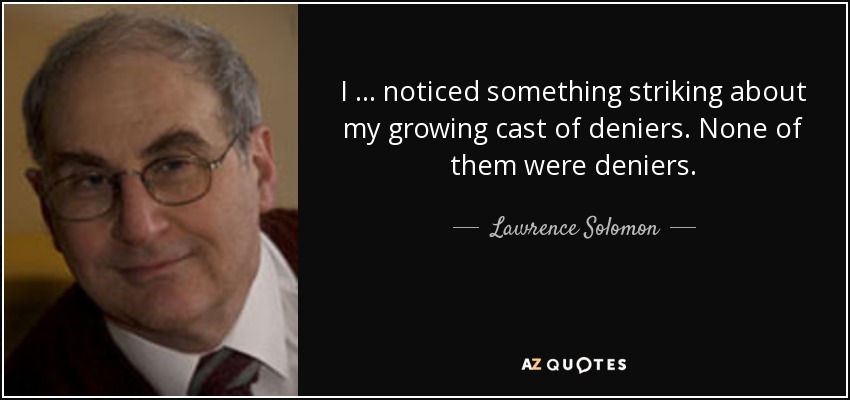Lawrence Solomon has been “speaking truth to power” for decades. He tackles controversial topics like the environment, climate change, and, yes, vaccines. It may seem like an odd mix, but it’s part of a stellar career tied with a common thread.
A leading Canadian environmentalist
Solomon is a columnist with the Financial Post. He’s also the executive director of a non-profit organization based in Toronto called Energy Probe. A leading Canadian environmentalist and author of seven books, Solomon writes thoughtful, well researched, and courageous articles for many newspapers, magazines, and on-line sites. Unlike so many journalists and thought leaders today, he’s not afraid to take on controversial topics. We’ve been corresponding, and Solomon generously agreed to answer some questions.

Vaccines and journalism jail
Jennifer Margulis: You’re one of Canada’s leading environmentalists but you’ve also written several outstanding articles about vaccines. So how did you first become interested in the topic of vaccines?
Lawrence Solomon: I’ve been interested in vaccines since I was a teen in the 1960s— along with civil rights and the Vietnam War, it was one of the issues that concerned us.
JM: What kind of responses have you gotten from your articles about vaccines?
LS: Some have been incredulous that I could question vaccines, but most haven’t. A common response from readers who follow me has been surprise. They say things like “I never knew there was a valid debate,” or “Why haven’t I heard this before?”
The most eye-opening responses have come from medical researchers and physicians, some who have high profiles and hold high positions, who have anecdotes about problems with vaccines, and also about reprimands that they or their colleagues have experienced for voicing concerns, even informally among peers.
Journalists face censorship for writing about vaccine safety
JM: Several journalists, myself included, have experienced stonewalling and censorship when they report on vaccine safety. Paul Offit, M.D., went so far as to suggest that journalists go to “journalism jail” for writing about vaccines. Why is there so much vehemence around this subject?
LS: In the last five years or so, few journalists have been permitted to question the safety or efficacy of vaccines in the mainstream media—vaccines have become a taboo subject. With the enforcement of this media blackout, many who favor mandatory vaccinations have been emboldened in the knowledge that they can’t be publicly challenged, and have become more vociferous in their views. Many who oppose mandatory vaccinations, meanwhile, have been silenced.
Public health repercussions?
JM: Journalists shy away from reporting on vaccine side effects or over-vaccination often because they are told by their editors that this may lead to fewer people being vaccinated, which could have deadly public health repercussions. Are the editors right? Vaccines are an essential part of public health. Is it better for journalists to ignore the problems with waning vaccine efficacy, safety issues, and inadequate pre-market testing?
LS: Vaccines aside, journalists and their editors have no hesitation in debating the safety or efficacy of any pharmaceuticals, or of any public health policy, although lives are at stake there, too. Vaccines are special because it is an ideological issue.
Most journalists and their editors would ordinarily think nothing of covering vaccines, but they are under implicit if not explicit orders from their superiors to avoid any questioning of vaccines. Society is a loser, because the pharmaceutical companies and the public health establishment are under little pressure to be accountable for their actions.

Linda Morin holding up a photograph of her daughter, who died after getting an HPV vaccine. Screenshot from a censored Toronto Star investigation. The newspaper deleted the story from the Internet.
Controversy in a Toronto newspaper
JM: Did you follow the 2015 controversy in the Toronto Star? Two outstanding reporters wrote a long article on the HPV vaccine, called “The Dark Side of Gardasil.” They interviewed several Canadian families whose children had serious adverse events following vaccination. Some of the teens died. Then outraged doctors criticized the article.
First the editors revised the story to reflect the mainstream doctors’ concerns about missing research. But then the newspaper actually pulled the article from their website. Was that an example of irresponsible reporting, as the Washington Post (applauding the decision to censor it) later stated? Or an example of profit and power pulling rank over human health? (By the way, I contacted one of the reporters by phone and then the article editor by email. Both sounded like they wanted to talk to me but were also extremely reluctant.)
LS: The Toronto Star article provided much needed balance in an area that is almost entirely one-sided. The article was criticized for anecdotal reporting yet this is what newspapers do—newspapers are full of human interest stories of all kinds, including of people who suffer medical misfortunes. Because the medical misfortunes involved vaccines, rather than other pharmaceuticals, the Toronto Star came under withering pressure and caved.
One dose of Gardasil, 34 days in the hospital

From the censored Toronto Star investigation: “One of the side-effect reports in Health Canada’s database relates to 14-year-old Frédérick St-Germain’s heart attack. St-Germain was hunting snow geese with her father and brother when she collapsed. It was October 9, 2010. She had received her first Gardasil vaccine nine days earlier. St-Germain’s heart stopped for 15 minutes before paramedics reached her rural Quebec home. They resuscitated her, said her mother, Mylène Boisvert. She spent 34 days in hospital, six of them in an induced coma.
‘I had to relearn everything, things that a 2-year-old would have to learn,’ St-Germain, now 18, told the Star. Months later, after a battery of tests came up negative, a cardiologist reported to Health Canada and Merck that he suspected Gardasil caused the girl’s heart attack. Many of the girls interviewed by the Star said that as they struggled to learn what was ailing them, doctors told them the illnesses were imagined, that they had eating or anxiety disorders, that the problems were in their head.”
For-profit medicine: a conflict of interests?
JM: A Canadian doctor I met on an airplane said rather astutely that he felt like the entire American medical system is a conflict of interests. American doctors earn more money the more they intervene, the more technology they use, and the more aggressively they treat patients. What do you think of the American for-profit medical system? Are things better in Canada?
LS: I don’t like either system. I prefer the pre-Medicare system that existed when I was a child. My family was poor but never wanted for health care—doctors spent more time with patients then, made house calls, and, to my knowledge, never pressed for payment when their patients were impecunious.
JM: What question did I forget to ask? Is there anything else you want to tell me about vaccine controversies, childhood health, or journalistic censorship?
LS: Much if not most of what we’re told about vaccines in the mainstream media is spin if not just plain false. Those who oppose mandatory vaccination include physicians and scientists at the very top of their professions.
Related posts:
Your Child NEEDS an HPV Vaccine, Here’s Why
Coronavirus Vaccine Questions
The Problem with Aluminum (Spoiler: It Can Cause Brain Damage)
Why This Yale Scientist Believes the TIMING of Vaccines is Harmful
Hib Vaccine and Sensory Processing Disorder
Updated: February 22, 2021
Leave a Reply